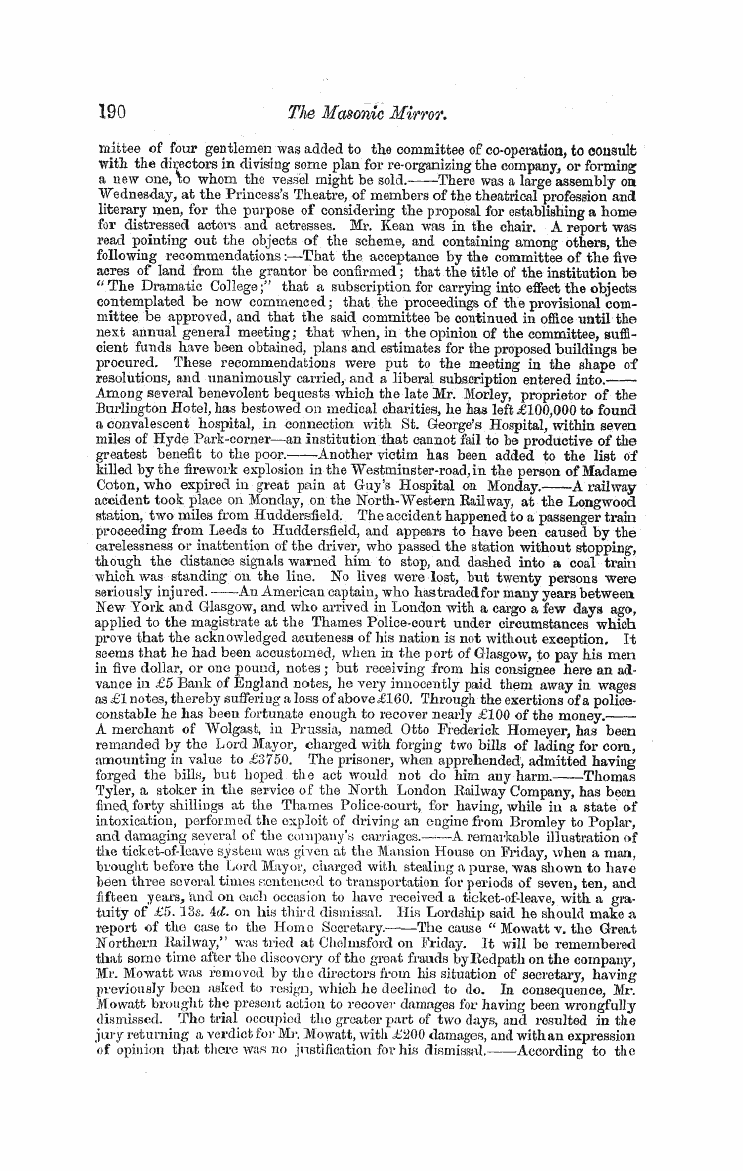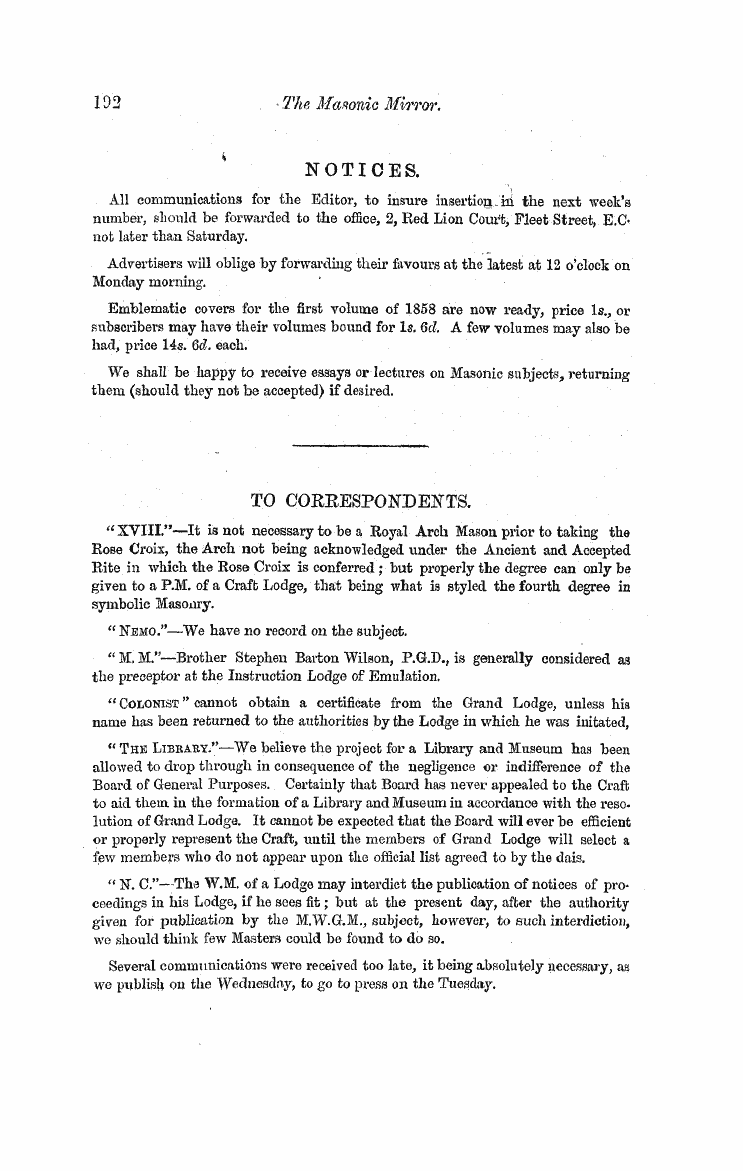Note: This text has been automatically extracted via Optical Character Recognition (OCR) software.
The Week
merely a remodelling- for the purpose of improving the machinery established in this country for the * Government of India . After some discussion , the bill was read a second time . On Friday the Earl of Derby , in answer to the Marquis of Clanricarde , said that the ex-king of Ohde was now a state prisoner at Calcutta , under strong suspicion of having promoted the revolt . Their lordships went into committee on the India Bill . After considerable discussion the various clauses
were agreed to , and the House resumed . ——In the House of Commons on Monday , on the order of the day for resuming the committee of supply , Mr . Hutt called the attention of the House to the report of the committe es on the slave trade in 1848 and 1849 , and moved that it Avas expedient to dis . eontinue the practice of authorising her Majesty ' s ships to visit and search vessels under foreign flags , with a view of suppressing the traffic in slaves . The honourable gentleman contended that all our attempts to put down the slave trade by force had proved a complete failure , and should , after such . ' . an extendedexperience , be abandoned . The
motion was negatived by a majority of 228 to 24 . The House then went into committee , and the vote for the mixed commission was agreed to . On Tuesday the House again went into committee olj supply ; when the vote for the ecclesiastical commission was carried by 67 to 6 L On Wednesday the Reformatory Schools ( Ireland . ) bill passed through committee , and the House again went into comniittee , when the estimates were completed . On Thursday Mr . BpAvyer asked the Secretary of State for the Home Department if his attention had been directed to an explosion of fireworks which had occurred in the Westminster-road , and whether
he proposed to take any measures in consequence ? Mr . Walpole said his attention had been directed to the subject ^ but he had not as yet had time to decide upon the course which it might be necessary to pursue . The Chancellor of the Excheq u er moved for leave to bring in a bill for the main drainage of the metropolis . He dwelt on the necessity of purifying the Thames ^ and said the only question Avas as to whether it should be dealt Avith as a national or a local undertaking . The government had arrived at the conclusion that the necessary works must he paid for by the metropolitan districts . The subject had been well con
sidered by the Metropolitan Board of Works , which was ready to undertake the Avorks if tliey were furnished Avith the requisite financial poAvers . The sum required would be probably £ 3 , 000 , 000 . The . proposition , he had to submit was , that the Metropolitan Board of Works should be empowered to levy a special rate for the express purpose of carrying out and completing the project . . Thebdl would contain provisions for establishing a sinking fund , so that the whole df the expenditure might be liquidated in a given period . It Was proposed to give the board the power of levying a special rate of 2 d . in the pound for a period of forty
years . It was calculated that such a rate would realize about £ 140 , 000 per annum , The works , it was estimated , would be completed by . the close of the year IS 63 . The hoard would require about £ 600 , 000 per annum for the actual outlay , and in order that the board might be enabled to obtaiii this money on the best terms , the guarantee of the nation Would be given to the lenders . It was estimated that principal and interest would be liquidated in forty years , as no doubt the money might be raised at a rate not exceeding 4 per cent . With respect to details the board would be left entirely at freedom . Leave was given to bring in
the bill , and some formal business transacted . On Friday after considering the Corrupt Practices Prevention Act Continuation Bill in committee , it was moved that the Jew bill be read a second time , upon which Mr . NeAvdegate moved that it be read a s econd time that day six nionths . After some discussion , ill which it appeared to be understood by a large portion of the House as but a temporary measure , the amendment Avas negatived by 156 to 65 , and the bill read a second time . The Chelsea . Bridge Bill passed through committee ; a motion , made by Sir J . Shelley ,
lor the abolition of the foot-toll , being rejected by 118 against 41 ; the Government however , so far giving way as to allow it to be opened toll free on Sundays . The news from India is of a very mixed character . It states that 13 , 000 of the rebels , who left Calpeo on the 23 rd May , reached Gwalior on the 1 st of June ; they were joined by 7000 of Scindia's troops , sent out to oppose them . They took possession of Gwalior , and plundered it . Scindia escaped to Agra . The force under Sir Hugh Rose , from Calpee , the division under Brigadier Hicks from Jhansi , the column under Colonel Smith , from Ohunbrace , at once made for Gwalior , and
Note: This text has been automatically extracted via Optical Character Recognition (OCR) software.
The Week
merely a remodelling- for the purpose of improving the machinery established in this country for the * Government of India . After some discussion , the bill was read a second time . On Friday the Earl of Derby , in answer to the Marquis of Clanricarde , said that the ex-king of Ohde was now a state prisoner at Calcutta , under strong suspicion of having promoted the revolt . Their lordships went into committee on the India Bill . After considerable discussion the various clauses
were agreed to , and the House resumed . ——In the House of Commons on Monday , on the order of the day for resuming the committee of supply , Mr . Hutt called the attention of the House to the report of the committe es on the slave trade in 1848 and 1849 , and moved that it Avas expedient to dis . eontinue the practice of authorising her Majesty ' s ships to visit and search vessels under foreign flags , with a view of suppressing the traffic in slaves . The honourable gentleman contended that all our attempts to put down the slave trade by force had proved a complete failure , and should , after such . ' . an extendedexperience , be abandoned . The
motion was negatived by a majority of 228 to 24 . The House then went into committee , and the vote for the mixed commission was agreed to . On Tuesday the House again went into committee olj supply ; when the vote for the ecclesiastical commission was carried by 67 to 6 L On Wednesday the Reformatory Schools ( Ireland . ) bill passed through committee , and the House again went into comniittee , when the estimates were completed . On Thursday Mr . BpAvyer asked the Secretary of State for the Home Department if his attention had been directed to an explosion of fireworks which had occurred in the Westminster-road , and whether
he proposed to take any measures in consequence ? Mr . Walpole said his attention had been directed to the subject ^ but he had not as yet had time to decide upon the course which it might be necessary to pursue . The Chancellor of the Excheq u er moved for leave to bring in a bill for the main drainage of the metropolis . He dwelt on the necessity of purifying the Thames ^ and said the only question Avas as to whether it should be dealt Avith as a national or a local undertaking . The government had arrived at the conclusion that the necessary works must he paid for by the metropolitan districts . The subject had been well con
sidered by the Metropolitan Board of Works , which was ready to undertake the Avorks if tliey were furnished Avith the requisite financial poAvers . The sum required would be probably £ 3 , 000 , 000 . The . proposition , he had to submit was , that the Metropolitan Board of Works should be empowered to levy a special rate for the express purpose of carrying out and completing the project . . Thebdl would contain provisions for establishing a sinking fund , so that the whole df the expenditure might be liquidated in a given period . It Was proposed to give the board the power of levying a special rate of 2 d . in the pound for a period of forty
years . It was calculated that such a rate would realize about £ 140 , 000 per annum , The works , it was estimated , would be completed by . the close of the year IS 63 . The hoard would require about £ 600 , 000 per annum for the actual outlay , and in order that the board might be enabled to obtaiii this money on the best terms , the guarantee of the nation Would be given to the lenders . It was estimated that principal and interest would be liquidated in forty years , as no doubt the money might be raised at a rate not exceeding 4 per cent . With respect to details the board would be left entirely at freedom . Leave was given to bring in
the bill , and some formal business transacted . On Friday after considering the Corrupt Practices Prevention Act Continuation Bill in committee , it was moved that the Jew bill be read a second time , upon which Mr . NeAvdegate moved that it be read a s econd time that day six nionths . After some discussion , ill which it appeared to be understood by a large portion of the House as but a temporary measure , the amendment Avas negatived by 156 to 65 , and the bill read a second time . The Chelsea . Bridge Bill passed through committee ; a motion , made by Sir J . Shelley ,
lor the abolition of the foot-toll , being rejected by 118 against 41 ; the Government however , so far giving way as to allow it to be opened toll free on Sundays . The news from India is of a very mixed character . It states that 13 , 000 of the rebels , who left Calpeo on the 23 rd May , reached Gwalior on the 1 st of June ; they were joined by 7000 of Scindia's troops , sent out to oppose them . They took possession of Gwalior , and plundered it . Scindia escaped to Agra . The force under Sir Hugh Rose , from Calpee , the division under Brigadier Hicks from Jhansi , the column under Colonel Smith , from Ohunbrace , at once made for Gwalior , and

































































































































































































